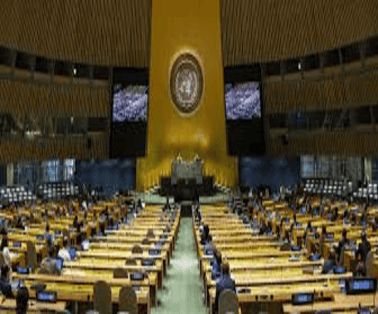The National Human Rights Commission (NHRC) issued a notice to the Odisha government, demanding an explanation as to why the Commission should not recommend a payment of monetary compensation to the next of kin of a person, who allegedly died in police custody.
What is Custodial Death?
- Custodial death refers to a death that occurs while a person is in the custody of law enforcement officials or a correctional facility.
- Custodial Death can happen due to Negligence by the concerned authorities in any form of torture or cruel, inhuman, or degrading treatment by the police officers whether it occurs due to investigation or interrogation, unlawful detention of a person more than a stipulated time, and so on.
- Prisoners are entitled to fundamental rights under the Indian Constitution while they are in custody.
- They are not deprived of basic human rights except those which are curbed by the court.
- Custodial death generally refers to death either in police custody or judicial custody.
Types Of Custodial Death
- Police Custody:A police officer arrests the accused by following the receipt of information or compliant or report by police about crime and prevent him from committing further offenses and brings him to the police station is known as the police custody. In this, the accused is kept in the lock-up. Death in police custody can result from excessive force, torture, denial of medical care, or other forms of abuse or incidental cause.
- Judicial Custody:When an accused is kept in jail by the order of the concerned magistrate, then it is said to be under Judicial Custody. When an accused is presented before a magistrate, he can either be sent to jail or kept under police custody by the magistrate. Death in judicial custody may occur due to overcrowding, poor hygiene, lack of medical facilities, inmate violence, or suicide.
- The Custody of the Army or Paramilitary Forces: It can happen through torture or extrajudicial killings.
NHRC and Constitutional Safeguards
Article 21:
Article 21 provides the citizens of India with the right to life and personal liberty. In the Case of D.K. Basu v. State of West Bengal, The Hon’ble Supreme Court held that the rights guaranteed under Article 21 of the Constitution could not be denied to convicts, under-trials, and other prisoners in custody, except according to the procedure established by law. There are certain rights for prisoners conferred in Article 21. They are: Right to bail, Right to free legal aid, Right against Solitary Confinement, Right against Handcuffing, Right against inhuman treatment.
Article 20:
Article 20(1) provides that a person should be prosecuted as per those laws that were in force when he committed the offense.
Article 20(2) provides that a person shall not be prosecuted and punished for the same offense more than once.
Article 20(3) provides that a person accused of an offense shall not be compelled to be a witness against himself.
Also, In Selvi v. State of Karnataka, the court observed that the state could not perform narco-analysis, polygraph, and brain-mapping tests on any individual without their consent.
Article 22:
Article 22 guarantees protection against arrest and detention in certain cases and provides that no person who is arrested shall be detained in custody without being informed of the grounds of such arrest. They shall not be denied the right to consult and defend themselves by a legal practitioner of his choice.
Legal Framework Supporting NHRC Investigations
- Section 24 Indian Evidence Act, of 1872 declares that all the confessions made by the accused by succumbing to the threat of investigating agencies would not be admissible in a court of law.
- This Section primarily works to prevent the accused from giving confessions using force against his will.
- Sections 330 and 331 of the Indian Penal Code (IPC) criminalise voluntarily causing hurt or grievous hurt to extort confession or information from any person.
- Section 41 of the Criminal Procedure Code (CrPC) was amended in 2009 to include safeguards so that: Arrests and detentions for interrogation have reasonable grounds and documented procedures. Arrests are made transparent to family, friends, and the public, and there is protection through legal representation.
Landmark Judgments Backed by NHRC Principles
- Kishore Singh Vs. State of Rajasthan (1981): The Supreme Court held that the use of third degree by the police is violative of Article 21 of the Constitution of India.
- Nilabati Behera vs. State of Orissa (1993): The Supreme Court held that the state is liable to pay compensation for custodial deaths resulting from police negligence or brutality, recognizing the state’s responsibility for protecting the right to life.
- Joginder Kumar v. State of Uttar Pradesh (1994): The Supreme Court dealt with violation of human rights because of indiscriminate arrests. They referred to the recommendations made in the Third Report of the National Police Commission that police should avoid arrest provided only in heinous offence.
- D.K. Basu vs. State of West Bengal (1997): The Supreme Court laid down specific guidelines to prevent custodial torture and deaths, including requirements for arrest memos, the right to medical examination, and access to legal counsel.
International Conventions Supporting NHRC’s Mandate
International Human Rights Law, 1948:
The International Human Rights Law contains a provision that protects people from torture and other enforced disappearances.
United Nations Charter, 1945:
It calls for treating prisoners with dignity. The Charter clearly states that despite being prisoners, their fundamental freedoms and human rights are set out in the Universal Declaration of Human Rights, the International Covenant on Civil and Political Rights, and the International Covenant on Economic, Social, and Cultural Rights.
The Nelson Mandela Rules, 2015:
The Nelson Mandela Rules were adopted by the United Nations General Assembly in 2015 to treat prisoners with inherent dignity and to prohibit torture and other ill-treatment.
United Nations Convention Against Torture (UNCAT):
It is an international human rights treaty under the purview of the United Nations that aims to prevent torture and other acts of cruel, inhuman, or degrading treatment or punishment around the world.
Why Custodial Deaths Persist in India
- India does not have an anti-torture legislation and is yet to criminalize custodial violence, while action against culpable officials remains illusory.
- The entire prison system is inherently opaque giving less room to transparency. India also fails in bringing the much-desired Prison Reforms and prisons continue to be affected by poor conditions, overcrowding, acute manpower shortages and minimal safety against harm in prisons.
- The use of excessive force including torture to target marginalised communities and control people participating in movements or propagating ideologies which the state perceives as opposed to its stature.
- Although India has signed the United Nations Convention against Torture in 1997 its ratification still remains. While Signing only indicates the country’s intention to meet the obligations set out in the treaty, Ratification, on the other hand, entails bringing in laws and mechanisms to fulfil the commitments
Key Concerns Highlighted by NHRC
- Violation of Fundamental Laws: Custodial death due to torture and violence by police is against the fundamental structure and values of the Indian Constitution.
- Against Moral Values: Sometimes, the police authority abuses the convicted even before the formal arrest, claiming injuries occurred prior to custody.
- Severe Offenses Committed by Police Misusing the Custody: Sometimes, police misused the Custody and causing torture to the victims. Rape is one of the prevalent forms of custodial torture.
- Harassment: It is prevalent among the police and leads to many sufferings to the victims.
- Illegal Detention: Depriving an individual of their personal liberty without following the process of law amounts to illegal detention. It includes unlawful imprisonment, continuous restraint of a person at a place or restraining a person from reaching a place.
- Fake Encounters: It is a type of custodial death, and has recently been used in the headlines. Pradeep Sharma, a former Mumbai Police ‘encounter specialist,’ has been sentenced to life imprisonment by the Bombay High Court for his involvement in the fake encounter in 2006. This landmark judgment marks the first conviction of police officers in a fake encounter case in India.
Conclusion: Strengthening Human Rights Through NHRC
The National Human Rights Commission (NHRC) plays a vital role in upholding constitutional rights and curbing custodial abuse in India. As cases like the recent Odisha custodial death show, NHRC’s interventions are crucial for justice, accountability, and institutional reform. While the Commission continues to be a watchdog, stronger legal frameworks, ratification of UNCAT, and police reform are urgently needed to make lasting change.
To Download Monthly Current Affairs PDF Click here
Click here to get a free demo
Discover all about CLAT Exam



